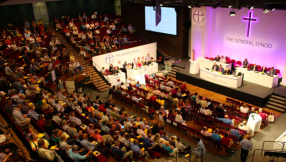
I don't always agree with Dr Michael Brown but I do find his columns stimulating. In his latest article, Dr Brown sought to answer a question that I suspect many British Christians are asking: after 'that' debate, why do so many evangelicals strongly support Trump? I must admit I found his arguments engaging but far from persuasive, and yet another indicator that evangelical support for Mr Trump is beginning to fray at the edges.
Now I am no fan of the current President but I am no 'Biden buddy' either. I fact, if I were a US citizen I would feel as conflicted as I did when faced with the choice of voting for a party led by Jeremy Corbyn or by Boris Johnson, and so I hope my observations have been shaped by a measure of objectivity.
Dr Brown sought to justify the strength of evangelical support the President is receiving by comparing him to a 'cage fighting neighbour' who has stepped in to defend a family threatened with violence. Michael Gerson said something similar a few years ago. Gerson, who served as President George W Bush's chief speechwriter from 2001 until June 2006, wrote in The Atlantic a couple of years ago that this unexpected response to Mr Trump should be understood as "the story of how an influential and culturally confident religious movement became a marginalized and anxious minority seeking political protection under the wing of a man such as Trump, the least traditionally Christian figure – in temperament, behaviour, and evident belief – to assume the presidency in living memory."
In other words, the man who famously said real power is 'fear' has captured the hearts of millions of Christians for that very reason!
I can sympathise with Dr Brown's reasoning and his deep concerns but it surely betrays a lack of faith to suggest that the Church needs to be defended by any human being, however powerful he or she might be. Unfortunately, God's people often fall foul of this beguiling temptation which is why the Psalmist said: "Put not your trust in princes, in a son of man, in whom there is no salvation. When his breath departs, he returns to the earth; on that very day his plans perish. Blessed is he whose help is the God of Jacob, whose hope is in the Lord his God, who made heaven and earth, the sea, and all that is in them." (Psalm 146)
The Church needs to remember that if God is for us nothing can stand against us. Faith surely mean trusting that He is in control and that Jesus was telling the truth when he said, "I will build my church, and all the powers of hell will not conquer it."
And if this isn't sufficiently encouraging, we have the assurance that God is at work in all things for the good of those who love Him.
We are to pray then, for those who are in authority, but we must resist the temptation to become too closely identified with the state. For when that relationship gets too intimate, our witness is tarnished and our trust in the risen Lord is weakened. Yes, the current abortion laws are a blight on our cultures, for example, but Martin Robinson's observation on the campaign to abolish slavery have much to teach us. "Wilberforce," he writes in Invading Secular Space, "understood that it was not jut a matter of working for legislative change in particular areas. First of all, public sentiment had to be shifted. The core assumptions of society needed to be challenged." If it was true for Wilberforce, it is surely no less true for us.
The Church is meant to be in the business of capturing peoples' hearts and changing their minds, not identifying with a particular politician or party, however much we might agree with their agenda as individual believers. And we can get on with that confidently because God and history are on our side. After all, the resurrected Jesus is our trump card, not any man in the Oval Office.
Rob James is a Baptist minister, writer and church and media consultant to the Evangelical Alliance Wales. He is the author of Little Thoughts About a Big God.
Views and opinions published in Christian Today are those of the authors and do not necessarily reflect the views of the website.













